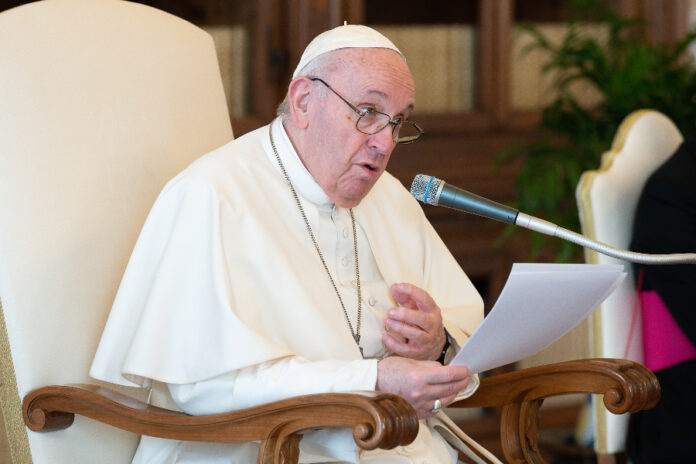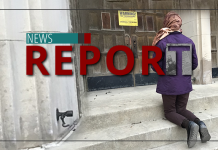Vatican City, Mar 25, 2021 / 07:19 pm MT (CNA).- Following a Vatican clarification that the Church cannot bless same-sex unions, some media outlets have speculated about Pope Francis’ involvement – or lack thereof – in releasing the document.
However, the pope’s consent is a necessary part of any responsum, and Pope Francis himself has multiple times reiterated the Church’s well-established teaching on marriage and sexuality.
The document in question is the responsum (response) which the Congregation for the Doctrine of the Faith gave to a question about the blessing to same-sex unions. The responsum said that “God cannot bless sin.”
The responsum also stressed that “the Christian community and its Pastors are called to welcome with respect and sensitivity persons with homosexual inclinations and will know how to find the most appropriate ways, consistent with Church teaching, to proclaim to them the Gospel in its fullness.”
The Church cannot bless sexual unions outside the marriage of one man and one woman, the document said. However, blessings can be given “to individual persons with homosexual inclinations, who manifest the will to live in fidelity to the revealed plans of God as proposed by Church teaching.”
Although the document reiterates the Church’s longstanding teaching, it has sparked controversy and harsh reactions from progressive voices within the Church.
There has also been an attempt to distance Pope Francis from the document, with one media outlet claiming the issue was not discussed at the monthly plenary meeting of the CDF, but only by a small group of congregation officials.
However, the document itself clearly says that Pope Francis “was informed and gave his assent to the publication of the above-mentioned dubium, with the annexed Explanatory note.”
Responsi are responses of the Congregation for the Doctrine of the Faith to questions about the Catholic teaching. They originate at the monthly meetings of the Congregation. From there, cardinals, consulters and experts and consulted. This process can take months or years. The resulting responsum is then discussed by the Congregation before being presented to the pope, who can approve, reject, or amend the text. The pope must consent to the final document.
Not all the responsi are made public, but only those that have a particular meaning for the universal Church. Others are sent directly to the bishop, priest, or faithful who made the inquiry.
The timing of the recent responsum is significant, as there has been discussion about blessings of same-sex couples in the German Church’s “Synodal Path,” with several German bishops suggesting such blessings are acceptable.
Pope Francis, then, was undoubtedly aware of the content of the responsum, and authorized its publication. On numerous occasions, the pope has stressed the importance of defending marriage as the union of man and woman and the foundation of a family.
Furthermore, the message of the document is nothing new. The Church has long made clear that it cannot endorse same-sex unions.
In 1975, the CDF issued Persona Humana, which dealt with the pastoral care of persons with homosexual tendencies.
In some cases, this document said, “people conclude that their tendency is so natural that it justifies in their case homosexual relations within a sincere communion of life and love analogous to marriage.”
The CDF stressed that all persons must be treated pastorally and with understanding, but clarified that “no pastoral method can be employed which would give moral justification to these acts on the grounds that they would be consonant with the condition of such people. For according to the objective moral order, homosexual relations are acts which lack an essential and indispensable finality.”
In 1986, the CDF sent a “Letter to the Bishops of the Catholic Church on the Pastoral Care of Homosexual Persons.”
The letter encouraged bishops “to provide pastoral care in full accord with the teaching of the Church for homosexual persons of their dioceses.”
Nevertheless, the letter said, “increasing numbers of people today, even within the Church, are bringing enormous pressure to bear on the Church to accept the homosexual condition as though it were not disordered and to condone homosexual activity. Those within the Church who argue in this fashion often have close ties with those with similar views outside it. These latter groups are guided by a vision opposed to the truth about the human person, which is fully disclosed in the mystery of Christ. They reflect, even if not entirely consciously, a materialistic ideology which denies the transcendent nature of the human person as well as the supernatural vocation of every individual.”
In 1992, the CDF published “Some considerations concerning the response to legislative proposals on the non – discrimination of homosexual persons.”
That document stressed that “homosexual persons, as human persons, have the same rights as all persons including the right of not being treated in a manner which offends their personal dignity.”
However, the document noted that “there are areas in which it is not unjust discrimination to take sexual orientation into account, for example, in the placement of children for adoption or foster care, in employment of teachers or athletic coaches, and in military recruitment.”
In 2003, the CDF published “Considerations regarding proposals to give legal recognition to unions between homosexual persons,” which clarified that “the Church teaches that respect for homosexual persons cannot lead in any way to approval of homosexual behavior or to legal recognition of homosexual unions. The common good requires that laws recognize, promote and protect marriage as the basis of the family, the primary unit of society.”
Drawing on this well-established background, the latest responsum has solid roots in Church teaching. The Congregation for the Doctrine of the Faith has found it reasonable to pronounce this teaching once again.
Subscribe to our daily CNA newsletter
At Catholic News Agency, our team is committed to reporting the truth with courage, integrity, and fidelity to our faith. We provide news about the Church and the world, as seen through the teachings of the Catholic Church. When you subscribe to the CNA UPDATE, we’ll send you a daily email with links to the news you need and, occasionally, breaking news.
As part of this free service you may receive occasional offers from us at EWTN News and EWTN. We won’t rent or sell your information, and you can unsubscribe at any time.
























